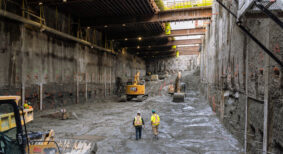Shortages of skilled workers in Alberta are well-known and well-documented, and this year the federal government overhauled the Temporary Foreign Worker (TFW) Program and created a precarious situation for the future of a successful construction industry in Alberta.
Using national data as its rationale, the federal government implemented additional administrative processes, fees, and restricted access to skilled international labour.
Although many of the temporary foreign workers in Western Canada fall into the ‘high wage’ median, the changes are going to significantly increase the financial and administrative processes for the employers in order to access the TFW Program.
Restricting access to skilled workers in Alberta is not going to solve the problems that the program is attempting to fix. While a small number of companies abused the system, the sweeping and unnecessary changes have created additional challenges for the construction industry in meeting our economic challenges in Western Canada.
One message that is not mentioned enough in the ongoing TFW debate is the sheer number of skilled employees that are needed in Alberta. This is not a case of competition between employees, but more a competition between employers, as they try to attract the most qualified candidates to work on the countless number of projects currently underway and planned in Alberta. To be onsite and contributing to these projects, specific skills and experience are needed, and these are not roles which can simply be offered to anyone looking for a job.
Canada-Alberta Job Grant Program
In order to begin addressing the issue of Alberta’s labour shortage and large skills gap among the unemployed population of the province, Alberta signed the Canada-Alberta Job Fund Agreement with the federal government in April 2014.
As part of this funding, the Canada-Alberta Job Grant (CAJG) was created to help employers develop workers to suit their needs and provide people with the jobs they need to succeed.
This program is employer driven, which means employers will make decisions as to who will be trained and what type of training they need for the job the employer has available. Employers will be reimbursed two-thirds of direct training costs to a maximum of $10,000 per trainee.
Employers are responsible for identifying appropriate training facilities and programs. As a third party training facility, the Merit College of Construction is an opportune choice for many of the construction companies working in or around Alberta.
With two training facilities (in Edmonton, and Calgary), and many classes arranged for other areas of the province based on need, the Merit College of Construction adjusts its schedule and courses every year to best suit the changing needs of the construction industry.
Training leaders has always been a priority for Merit, which is why the unique Supervisor Training Program and the Leadership Development for Supervisors have become such popular courses within the industry. The eligibility of training through the CJG program includes that the course must be more than 25 hours in length, provided by a third party trainer and must result in some sort of credential (record of completion, certificate, grade etc.), which are all requirements met through taking either Merit’s STP or LDS courses.
The Merit College of Construction also offers free CSTS to members, a wide range of safety and construction skills, management training, and E-Learning programs focussed on communication, planning, and negotiating, and seminars for HR personnel in the construction industry.
Full program implementation is targeted for September 2014.
Step in Right Direction
The Canada-Alberta Job Grant supports the training of the unemployed and unskilled labour market within the province, and is a step in the right direction for ensuring a successful future in this industry, but we need to acknowledge that this program will only produce so many successful candidates for the industry. With such a large labour gap affecting the industry, the need for skilled labour to complete the projects currently underway, can only be addressed through access to current skilled labour, whether Canadian or from overseas.
Accountable and accurate data is needed to ensure regional problems are addressed by the federal government. The recent overhaul of the TFW Program has been a large blow to the construction industry, and will negatively impact industry. Projects may not proceed and schedules will be affected if changes are not made to this program to facilitate the recruitment of needed workers.
Line Porfon is vice president of government relations at Merit Contractors Association.









